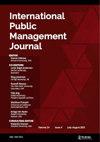信徒唱诗班?调查参与、反应偏差与公共服务动机之实验与纵向证据
IF 3
3区 管理学
Q2 PUBLIC ADMINISTRATION
引用次数: 0
摘要
通过调查收集数据是公共行政研究的重要方法,但调查研究有效性面临的一个被忽视的挑战是反应偏差,即反应行为与研究结果相关。在动机研究中,反应偏差尤其具有威胁性,因为动机是行为的重要决定因素,也很可能是调查参与的决定因素。具体来说,公共服务动机(PSM)可以增加为他人的利益投入时间和精力回应调查的意愿,而外在动机的个人可能不太愿意参与没有经济补偿前景的调查。本文通过使用预注册的现场实验和两个面板数据集来检查动机和反应偏差。实验研究表明,金钱激励提高了回应率,而以psm为导向的呼吁则没有。此外,在没有可检测到的PSM反应偏差的情况下,实现了激励的反应率增加。同样,小组研究对与PSM相关的反应偏倚提供了很少和混合的支持。这些证据表明:(1)PSM不是反应偏差的(强)驱动因素,(2)应用于PSM调查的外在动机工具不一定与反应偏差相关。本文章由计算机程序翻译,如有差异,请以英文原文为准。
Choir of believers? Experimental and longitudinal evidence on survey participation, response bias, and public service motivation
Abstract Collecting data through surveys are a vital method in public administration research, but an overseen challenge for the validity of survey research is response bias, which is when response behavior correlates with study outcomes. Response bias can be particularly threatening in motivation research because motivation is an important determinant for behavior and most likely also for survey participation. Specifically, public service motivation (PSM) can increase the willingness to devote time and effort to respond to surveys for the benefit of others, whereas extrinsically motivated individuals may be less inclined to participate in surveys without prospects of economic compensation. This article examines motivation and response bias by use of a preregistered field experiment and two panel datasets. The experimental study shows that a monetary incentive increases the response rate, whereas a PSM-oriented appeal does not. Furthermore, the increased response rate of the incentive is achieved without any detectable response bias on PSM. Likewise, the panel studies offer little and mixed support for response bias related with PSM. This evidence suggests that (1) PSM is not a (strong) driver of response bias, and that (2) extrinsic motivational tools applied to PSM surveys are not necessarily associated with response bias.
求助全文
通过发布文献求助,成功后即可免费获取论文全文。
去求助
来源期刊

International Public Management Journal
PUBLIC ADMINISTRATION-
CiteScore
5.30
自引率
11.50%
发文量
49
期刊介绍:
The International Public Management Journal (IPMJ) publishes high-quality empirical and theoretical work on managing large organizations, particularly public organizations. IPMJ features work from scholars around the world who conduct research in the areas of public management and government reform, comparative public administration, organizational theory, and organizational behavior. IPMJ seeks to provide a bridge between those conducting research on public management and public administration on the one hand, and those working in the areas of organizational behavior and organization theory on the other. IPMJ intends to stimulate and reflect the academic interests of an international constituency of readers and scholars.
 求助内容:
求助内容: 应助结果提醒方式:
应助结果提醒方式:


